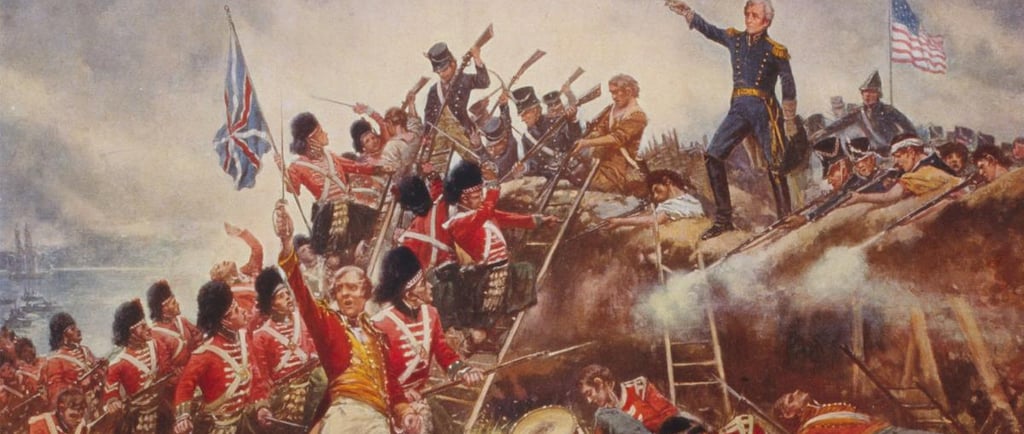A Latin Ode for the Battle of New Orleans
Every so often at the University of Kentucky, someone would mention the small book of poetry titled "Chelys Hesperia" (1825, by Samuel Wilson), usually in connection with the historic nickname for Lexington, “Athens of the West”. Not realizing that poor scans of it were available online, I along with some friends produced a scan of the original and transcribed it. Some excerpts of the work, which is about to see its 200th anniversary, are provided here.
Jackson Perry
2/6/20242 min read


ODA II.
Insignis Jacksoni Victoria, prope urbem Aureliam Novam de Britannicis
copiis reportata, Dic Octavo mensis Januarii 1815, in hac Oda celebratur.
Aureus Phoebus roseis quadrigis,
Jam diem laetum rediens revexit,
Jure festivum, tenebris fugatis
Territa ab urbe.
Mente saeva namque acies feroces
Britonum flammas meditantur urbi, et
Aureum vellus, misere ac rapinas
Arripere ardent.
Surgit Aurora ex croceo cubili;
Copiae hostiles simul et videntur
Progredi ex castris, pedibus citatis,
Dira minantes.
Imperat nostris animosus heros
Praelio Jackson, vehementer atque
Suscitat vires, acuitque Martem
Pectore firmo.
Arma nunc fulgent, litui strepuntque;
Ordines vallo rapide propinquant:
Clamor auditur; reboantque ripae
Nobilis amnis.
Impetum impulsi, sed inauspicatum,
Jam ter in vallum faciunt furore;
Fortiter nostri ter enim repulsant
Strage tremenda.
Fulminat Jackson, tonitru vibransque
Diruit densas subito phalanges
Hostium; sternitque duces superbos
Impete vasto.
Sic Pater Divum, nitido ex Olympo,
Flammea dextra jaculatus ignes,
Impias turmas pepulit Gigantum
Fulmine ad Orcum.
Hostibus justo domitis triumpho,
Urbe servata excidio nefando,
Gloriam noster meruit perennem
Lauriger heros.
O beata Aurelia salva perstes!
Hanc in aeternum celebresque lucem:
Concinant omnes memoresque grata
Carmina Divis.
This unusual poem commemorates the tenth anniversary of Andrew Jackson’s victory against the British at New Orleans. This crushing victory, won after a treaty ending the war had been negotiated, became a symbol of national pride in the following decades and made Jackson’s reputation. In 1824, he had emerged as an every-man candidate and won the popular vote (though not the election). The strength of that contemporary reputation is very evident here.
The beginning of the poem is standard for the topic, greeting the festive day. In the second paragraph, however, Wilson invokes the threat of pillaging that the southern campaign represented. In a poetic touch, New Orleans is compared to the golden fleece: a treasure distant from civilization that must be defended from raiders. The comparison is even more apt in light of New Orleans’ integral role in the international cotton trade.
Jackson emerges, animosus et Martem acuens, and quickly seizes the field while the Mississippi, that nobilis amnis, echoes the trumpet blasts. The three-pronged battle ends in a strages tremenda. Jackson is subtly praised with some jovial imagery as a general fulminans et tonitru vibrans conquering with an impete vasto. This is all good poetic fun... until the best part begins.
Wilson draws an explicit connection between Jackson and Jupiter, casting the giants into hell with lightning. Like the golden fleece, this comparison is not random. The gigantomachy was fought after the war against Saturn. It represents the second war that cements for all time the rule of the gods. This draws a broader metaphor between Olympus and America: after the Revolution, the War of 1812 cements America’s rule, pushing her enemies once again to Orcus, or, in this case... Britain! Wilson uses the suddenness of the battle to invoke the strength of Jupiter’s victory. Like the first Ode, this poem looks forward to the future with optimism.
How insane is this metaphor? Not quite as crazy as it appears at first. Jackson is the lauriger heros, that is, the general in a triumph who was dressed up as Jupiter. That legacy was at a fever pitch in 1825: Wilson’s thoughts about the 1824 election are easy enough to discern, even with Henry Clay living down the street. Today, Jackson’s legacy is very rightly complicated and diminished. The battle, though, is still commemorated annually. O beata Aurelia salva perstes!
For more American Latinity, see Contubernales Books’ Chelys Hesperia by Samuel Wilson and Washingtonii Vita by Francis Glass.
